Introduction
Land Acquisition Project Managers play a pivotal role in advancing energy and infrastructure development. They oversee the intricate process of acquiring land, starting from identifying potential properties to conducting comprehensive site evaluations. These evaluations ensure that selected locations align with project requirements and meet regulatory standards.
A crucial aspect of their role involves managing the due diligence process to address legal, environmental, and logistical considerations meticulously.
Navigating a complex web of local, state, and federal regulations is essential for maintaining compliance, demanding a deep understanding of the legal landscape and strategic oversight. Coordinating the efforts of various stakeholders, including landowners, legal teams, and regulatory bodies, is vital for balancing often conflicting interests. This coordination is particularly significant in the context of rising demand for renewable energy projects, which require careful site selection in line with automation and higher power requirements.
Project Managers are also integral to the transition towards sustainable energy systems, ensuring that energy systems are safe and effective, thereby contributing to the broader goal of decarbonizing the energy sector. By leveraging data and consulting services that provide insights into global energy markets, they aid in strategic decision-making. Ultimately, Land Acquisition Project Managers are at the forefront of driving energy and infrastructure projects to meet current and future demands while adhering to stringent regulatory requirements.
Key Responsibilities of a Land Acquisition Project Manager
Land Acquisition Project Managers are essential to advancing energy and infrastructure development. They lead the comprehensive process of acquiring land, beginning with identifying potential properties suitable for development. This involves conducting thorough site evaluations to ensure the chosen locations align with requirements and regulatory standards.
A significant part of their role includes managing the due diligence process, which ensures that all legal, environmental, and logistical aspects are meticulously addressed. They must navigate a complex web of local, state, and federal regulations to maintain compliance, a task that demands a deep understanding of the legal landscape and strategic oversight.
Furthermore, these professionals coordinate the efforts of multiple stakeholders, including landowners, legal teams, and regulatory bodies. This coordination is crucial for balancing the often-conflicting interests of different parties involved. For instance, the growing demand for renewable power initiatives requires a meticulous site selection process, as emphasized by recent trends in automation and elevated power needs.
Project Managers also play a key role in the transition towards more sustainable power systems. By ensuring that power systems are both safe and effective, they contribute to the broader goal of decarbonizing the sector. This transition is supported by data and consulting services that provide comprehensive insights into global power markets, aiding in strategic decision-making.
In sum, Land Acquisition Project Managers are at the forefront of driving forward energy and infrastructure projects, ensuring they meet both current and future demands while adhering to stringent regulatory requirements.
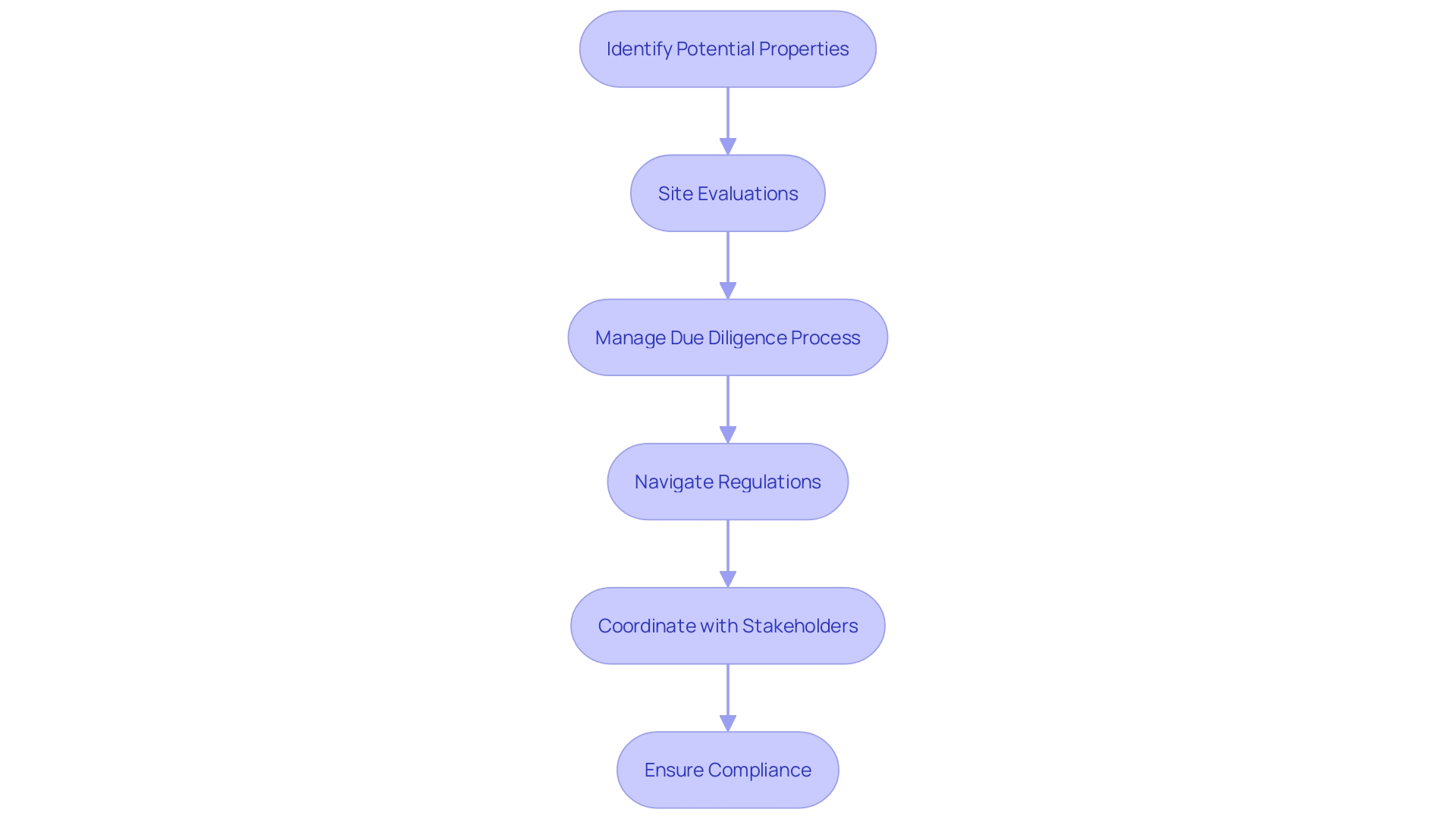
Conducting Market Research and Due Diligence
Market research serves as the cornerstone for Acquisition Project Managers, enabling them to gauge property values, discern market trends, and assess potential acquisition risks. This foundational step involves an in-depth analysis of property surveys, demographic trends, and local market conditions. As noted in industry insights, understanding the intricacies of different property types—residential, commercial, and others—is essential for making informed decisions.
Due diligence extends beyond basic research, encompassing meticulous investigations into property titles, zoning laws, and environmental assessments. This rigorous process, as emphasized by legal experts, is crucial for validating the feasibility of acquiring specific parcels of land. It involves a detailed examination of legal claims, regulatory compliance, and potential environmental impacts.
Additionally, the changing environment of energy and infrastructure development emphasizes the necessity for reliable collaborators who are knowledgeable in project economics and management of involved parties. As emphasized in recent reports, developers increasingly seek partners who can navigate the complex permitting processes and address the concerns of involved parties effectively.
By combining market research with thorough due diligence, Land Acquisition Project Managers can identify and mitigate potential obstacles, ensuring the successful acquisition and development of land. This thorough method not only improves the viability of the endeavor but also fosters trust and reliability among participants, which is crucial for lasting achievement in the industry.
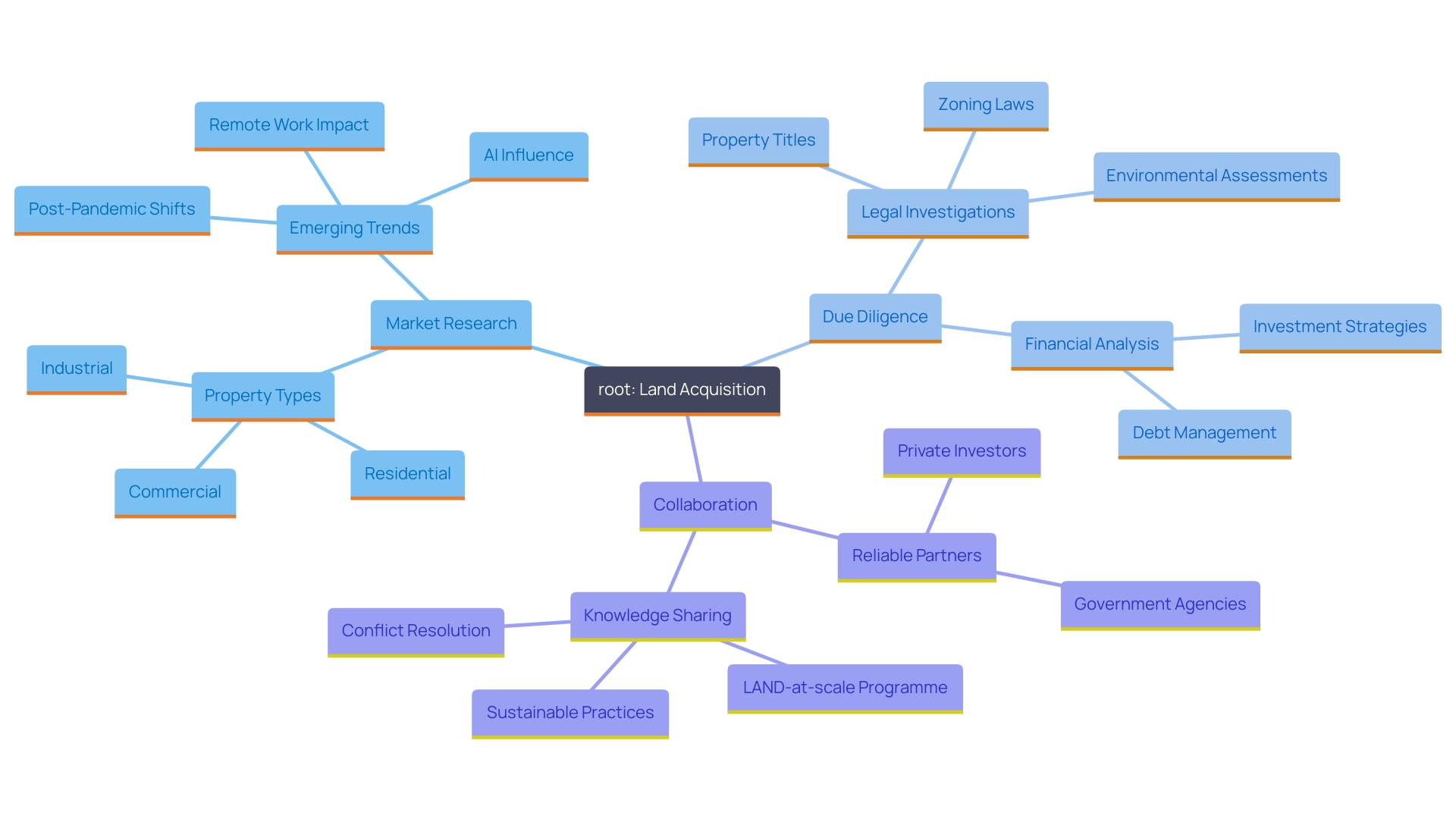
Negotiating with Landowners and Stakeholders
Effective negotiation skills are paramount for Land Acquisition Project Managers, as they navigate complex interactions with landowners to secure favorable terms for sale or lease agreements. These professionals must adeptly balance project objectives with the concerns of property owners, ensuring mutually beneficial outcomes. Building robust relationships and maintaining transparent communication channels with stakeholders are essential components of successful negotiations. As Shauna Gamble, Chief Procurement Officer at Bombardier, emphasizes, true negotiation begins with understanding the motivations and goals of others, paving the way for win-win solutions. 'The AREA-at-scale program, financed by the Netherlands Ministry of Foreign Affairs, exemplifies the importance of aligning natural capital investments with community aspirations to achieve success in territory governance and climate resilience initiatives.'. This method highlights the importance of negotiation abilities in managing property acquisition endeavors efficiently.
Overseeing Legal and Regulatory Processes
'Navigating the intricate legal structures of property acquisition is an essential duty for Project Managers, particularly in the swiftly expanding renewable power sector.'. These professionals must ensure that all legal documents are meticulously prepared, adhere to stringent environmental regulations, and address any disputes that may arise. The significance of this oversight cannot be exaggerated, as it protects initiatives from possible legal disputes and guarantees the timely acquisition of property. Recent developments in renewable energy, such as the expansion of wind and solar power, and the increased focus on carbon capture and geothermal resources, have intensified the need for robust legal and regulatory compliance. This complexity is further highlighted by the ongoing disputes between landowners and developers, which underscore the necessity for Project Managers to be adept in legal negotiations and conflict resolution.
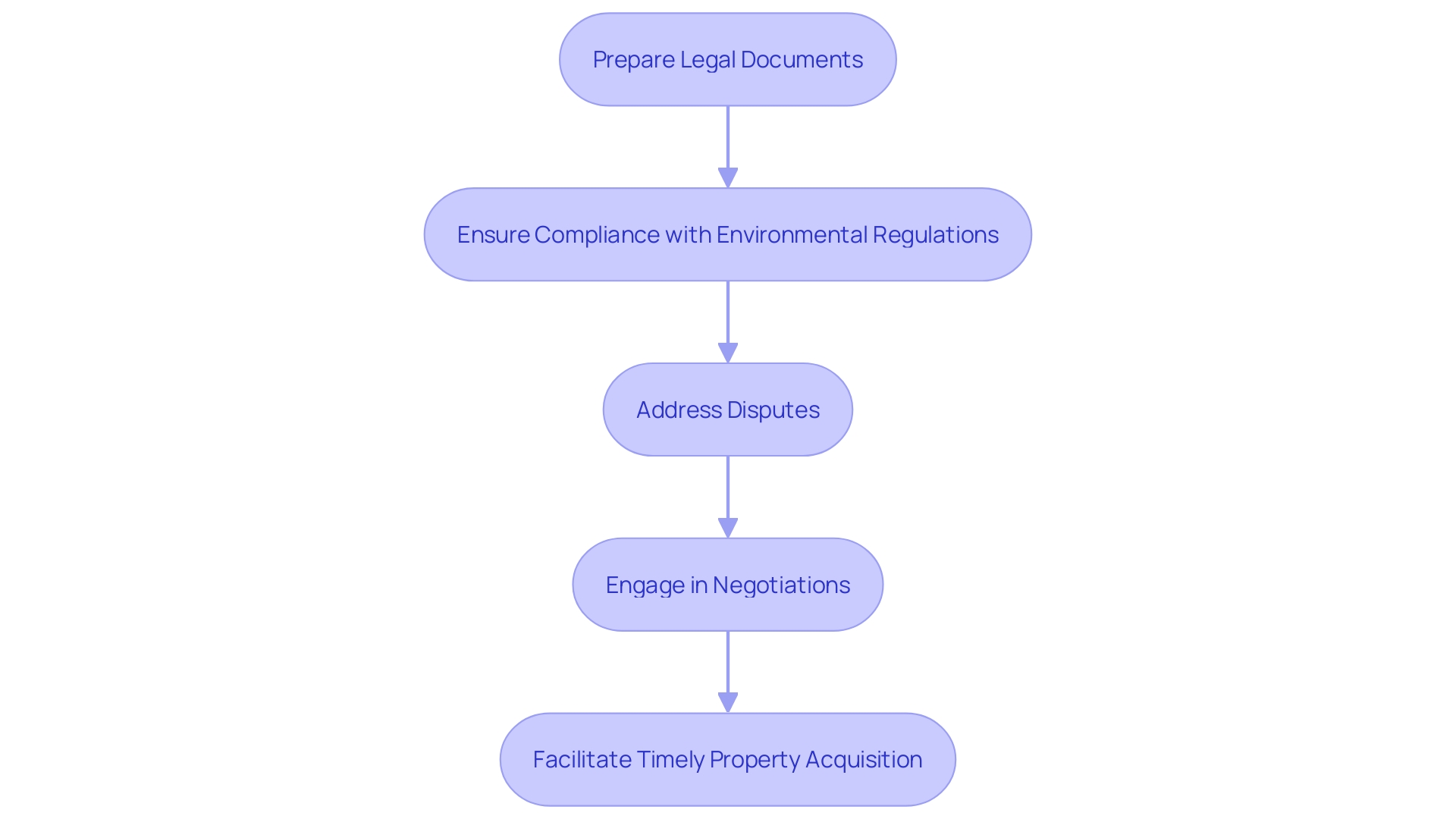
Managing Stakeholder Relationships and Communication
Effective stakeholder engagement is crucial for the success of any land acquisition initiative. Managers must convey objectives, timelines, and expectations clearly to all involved parties to foster collaboration and trust. Regular updates and transparent communication help mitigate misunderstandings and facilitate smoother project progression.
For instance, the LAND-at-scale programme, a seven-year initiative funded by the Netherlands Ministry of Foreign Affairs, emphasizes inclusive participant engagement to promote fair and efficient land use. The programme's emphasis on tenure security, gender, and conflict resolution underscores the significance of addressing varied participant interests.
In Khon Kaen, Thailand, the MapStakes toolkit has shown to be effective in improving participant inclusivity in smart city planning. By identifying, mapping, and involving interested parties, the toolkit ensures that all relevant voices are heard, leading to more comprehensive and accepted urban development plans.
Additionally, the method for sustainable power initiatives in the United States shows the importance of participant engagement. Policymakers have faced significant opposition due to inadequate opportunities for community members to voice their concerns. Enhanced involvement of interested parties can address these issues and speed up the shift to renewable energy.
Finally, tailored communication strategies are essential. Information must be relevant and understandable to involved parties, requiring adaptive methods such as phone calls, one-on-one meetings, and timely updates to maintain engagement and interest. This empathetic and flexible approach is key to successful stakeholder collaboration.
Financial Analysis and Budget Management in Land Acquisition
Land Acquisition Project Managers must harness financial acumen to conduct thorough financial analyses that inform strategic budget management. These professionals evaluate various costs associated with land acquisition, including purchase prices, legal fees, and potential development costs. This comprehensive financial assessment is essential for optimizing resources and ensuring that initiatives remain within budget. Moreover, understanding the economic impact of such investments is vital. As emphasized in recent studies, the costs and benefits of investment initiatives must be meticulously assessed, especially given the diverse impacts across different sectors. For instance, the role of the discount rate in decision-making, estimating willingness to pay for benefits, and quantifying health impacts are essential considerations. This approach not only ensures productive resource allocation but also addresses current global concerns such as population growth, urbanization, infrastructure pressure, inequality, and climate change.
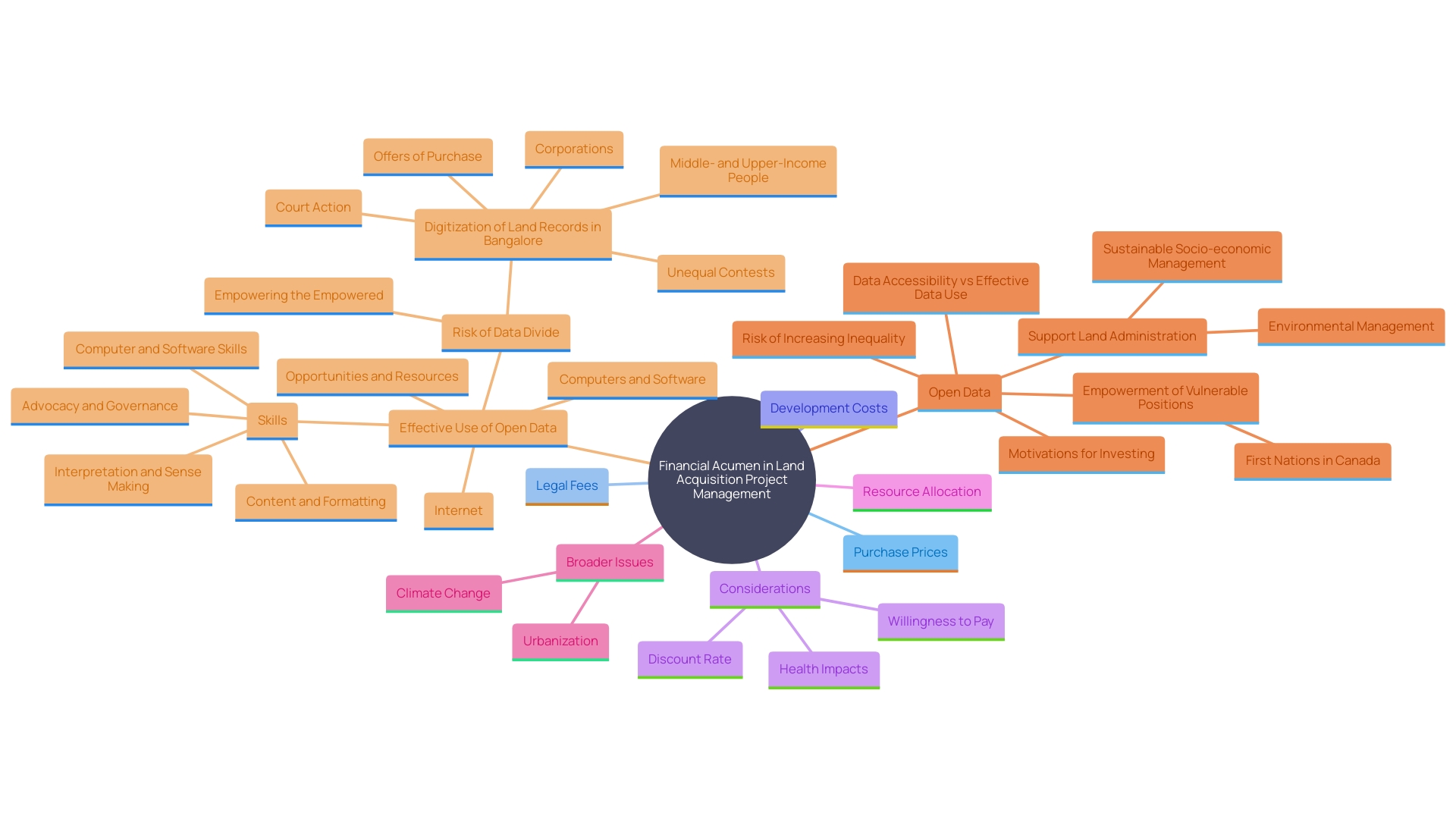
Project Coordination and Timeline Management
Effective coordination is pivotal in synchronizing the myriad tasks involved in land acquisition, ensuring that each phase is completed on time. Land Acquisition Project Managers meticulously craft detailed timelines that highlight critical milestones and deadlines. These timelines serve not merely as schedules but as comprehensive roadmaps that guide the entire process, from negotiations and stakeholder engagements to legal compliance.
Drawing lessons from historic endeavors like the Hoover Dam, which was finished ahead of schedule despite the Great Depression, underscores the significance of strong planning and accurate execution. The dam's construction involved the coordination of an unprecedented volume of concrete pouring—approximately 3.25 million cubic yards—demonstrating that meticulous planning and timeline adherence can overcome even the most daunting challenges.
In today's competitive power and utility markets, the capability to finish tasks on schedule and within financial limits is crucial. As one expert notes, 'Digital technology provides the tools necessary to accomplish those goals. A sound digital strategy is required to effectively guide an organization’s digital transformation and leverage digital technologies.' This sentiment is echoed in the modern context, where companies like Accenture emphasize the integration of technology and strategic planning to drive successful results.
Moreover, the increasing demand for renewable energy further highlights the need for precise coordination of tasks. As companies transition to automation to address workforce shortages, the subsequent rise in power requirements must be seamlessly integrated into planning. This is a critical consideration when mapping out timelines and resource allocation.
Ultimately, the essence of effective coordination lies in the ability to create and adhere to accurate timelines. As Benjamin Franklin aptly stated, 'You may delay, but time will not.' Neglecting the complexity of tasks or unexpected occurrences can result in major problems, making it crucial for managers to guarantee that each phase is carefully arranged and carried out.
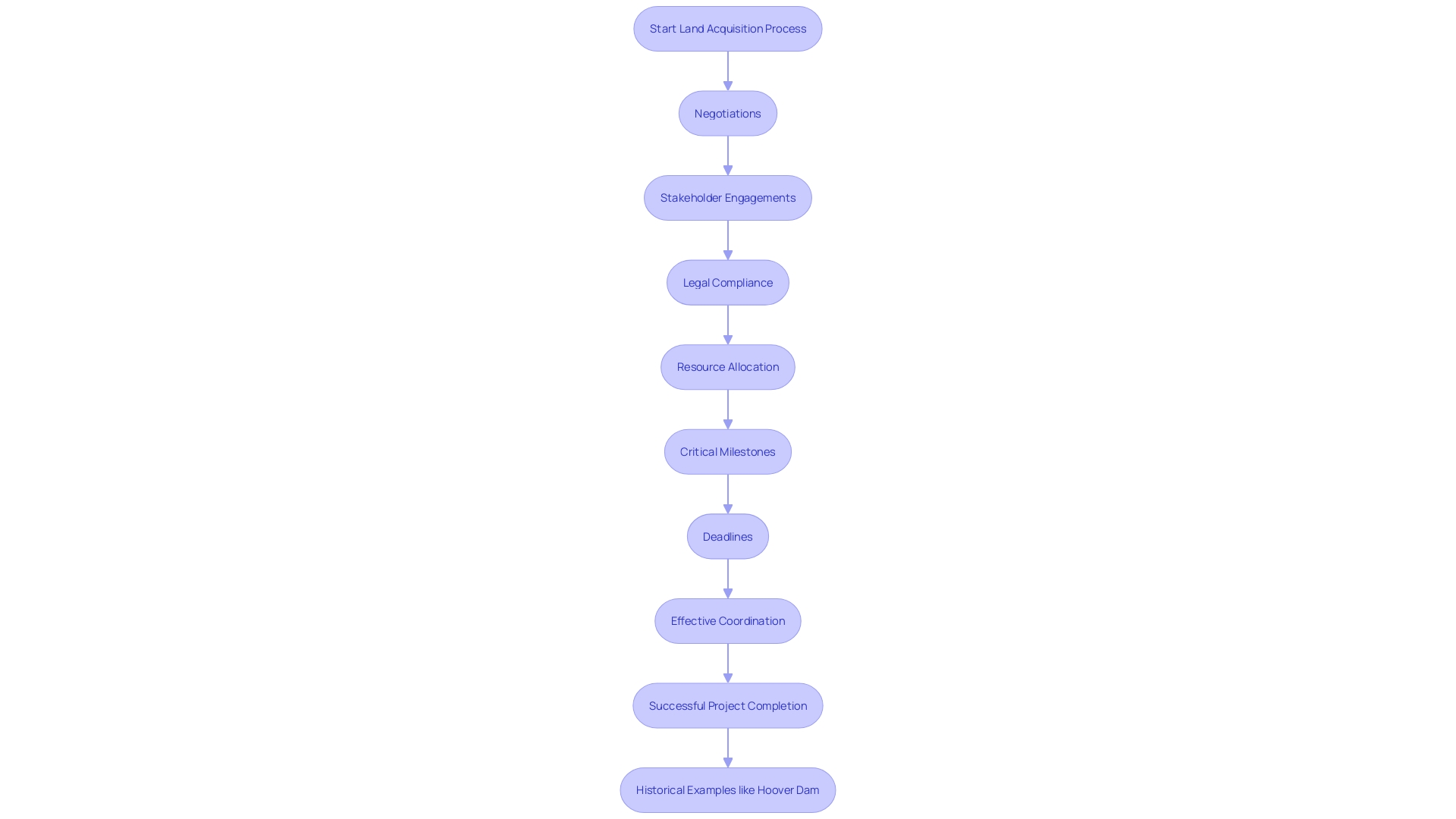
Essential Skills and Qualifications for Land Acquisition Project Managers
Successful Land Acquisition Project Managers bring a multifaceted skill set to the table, including robust negotiation capabilities, in-depth knowledge of real estate law, and proficiency in project management. These professionals often have backgrounds in land use planning, finance, or related fields, which equip them to handle the intricate aspects of land acquisition in energy and infrastructure development. Effective communication skills are indispensable, as these managers must navigate complex transitions and stakeholder negotiations.
For instance, companies like Alta Planning + Design emphasize the importance of teamwork and creativity in fostering a collaborative environment. Vincent Hellens' promotion to Regional Manager of Alta’s California practice underscores the value of professional excellence and internal growth. Likewise, Principal Consultants at DNV - ESG & Decarbonization are anticipated to possess demonstrated experience in delivering initiatives and business growth across sustainability, climate change, and corporate responsibility service areas, ensuring service excellence and strategic relationship management from the outset.
Industry statistics reveal that the demand for skilled workers in sectors such as solar photovoltaic panels and heat pumps is likely to outpace supply in nearly all studied countries, particularly in the Global North. This highlights the critical need for migration, alongside domestic training and reskilling, to meet green transition targets effectively.
Project managers in land acquisition roles must also be skilled at utilizing digital solutions to ensure power systems operate safely and effectively. The role encompasses not only technical expertise but also a strategic outlook to tackle the complex challenges of contemporary utilities and infrastructure projects. This blend of skills and experience is what enables successful navigation of the complex, interrelated transitions in the energy industry globally and regionally.
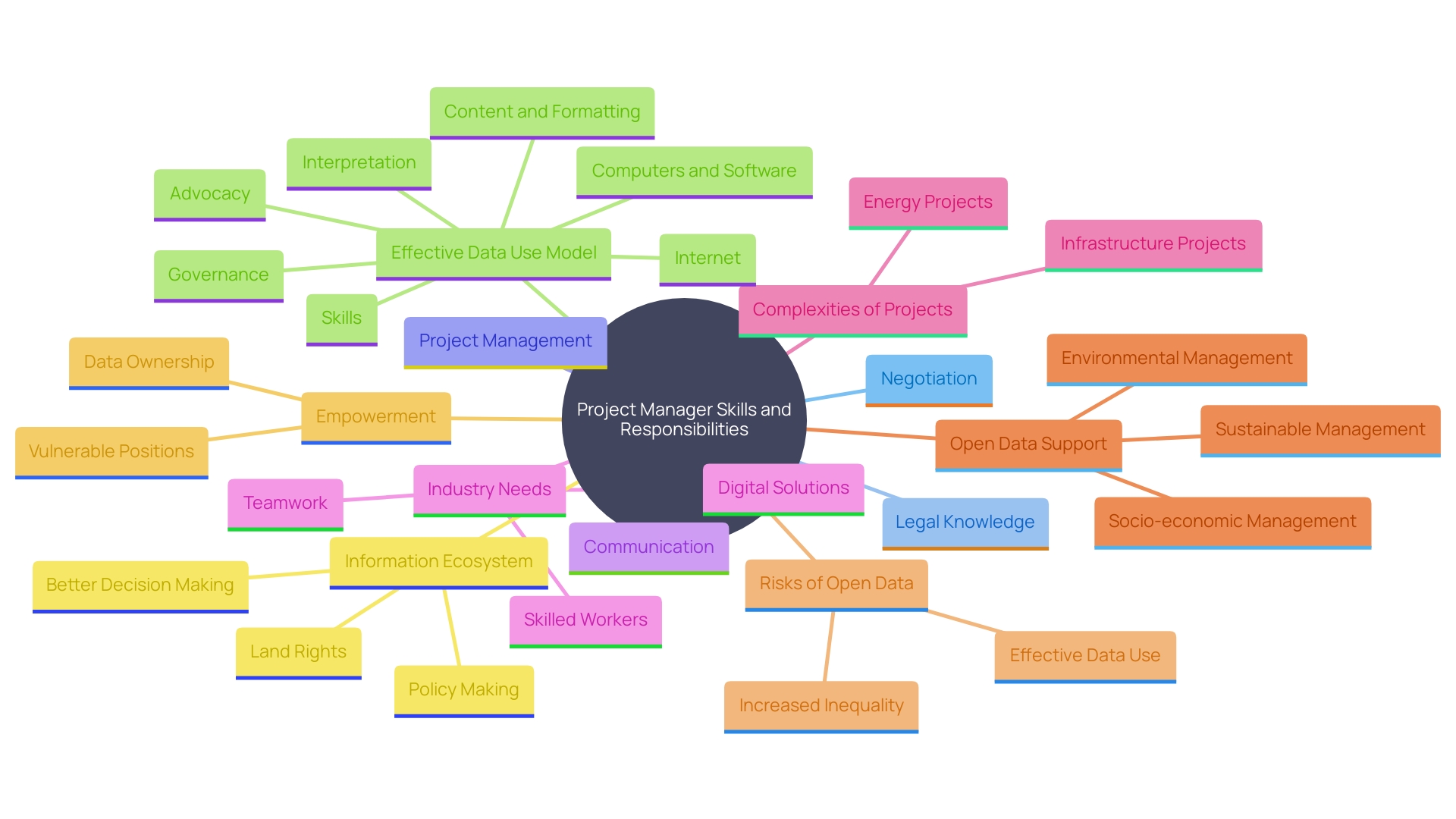
Conclusion
Land Acquisition Project Managers are integral to the successful advancement of energy and infrastructure projects. Their responsibilities encompass a wide range of activities, including identifying suitable properties, conducting thorough site evaluations, and managing the due diligence process. This comprehensive approach ensures that projects align with legal, environmental, and logistical requirements, allowing for effective navigation through the complex regulatory landscape.
Effective negotiation and stakeholder management are essential skills for these professionals. By fostering transparent communication and building strong relationships with landowners and other stakeholders, Project Managers can secure favorable terms and mitigate potential conflicts. The emphasis on inclusivity and collaboration is critical, particularly in the context of increasing renewable energy projects, where diverse interests must be balanced to achieve successful outcomes.
Financial analysis and budget management play a pivotal role in land acquisition efforts. Project Managers must conduct meticulous evaluations of costs and economic impacts to ensure that projects remain within budget while addressing the broader implications of their investments. Furthermore, effective project coordination and timeline management are crucial for synchronizing tasks and ensuring timely completion of projects, particularly in a rapidly evolving energy sector.
In summary, the multifaceted role of Land Acquisition Project Managers is characterized by their ability to navigate complex legal frameworks, engage stakeholders effectively, and manage financial resources strategically. Their expertise not only drives the successful implementation of energy and infrastructure projects but also contributes significantly to the transition towards sustainable energy systems. As the demand for renewable energy continues to rise, the importance of these professionals will only grow, underscoring their vital role in shaping the future of energy and infrastructure development.




